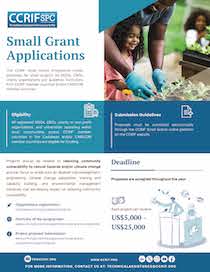Grand Cayman, Cayman Islands, September 8, 2020. CCRIF SPC made a payout of approximately US$7.2 million to the Government of Haiti on its Excess Rainfall (XSR) parametric insurance policy following three days of heavy rainfall associated with Tropical Cyclone Laura. Haiti also received a payout of US$290,925 under the Aggregate Deductible Cover (ADC), which is a special feature of CCRIF’s Tropical Cyclone (TC) and Earthquake (EQ) policies, which may be activated to provide a minimum payout for TC and EQ events that are objectively not sufficient to trigger the main policy because the modelled loss is below the attachment point.
The approximate total payouts to Haiti due to Laura are US$7.45 million, inclusive of the ADC, which was paid to the Government on September 7, 2020, within 14 days of the end of the rains associated with TC Laura.
Most of the damage on the ground from TC Laura in Haiti was associated with rainfall. The partial assessment of the damage undertaken by the Direction de la Protection Civile and other development partners indicate that Laura and the rains associated with the system resulted in: 31 persons losing their life with another 8 persons missing; approximatively 44,175 persons from 8,835 families being adversely affected; flooding of 6,272 homes, of which 2,320 suffered some damage and 243 were destroyed; the flooding of Port-au-Prince’s Toussaint Louverture International Airport; many roads and bridges being damaged, destroyed or blocked; and the destruction of agricultural crops and death of livestock.
Following the payout to the Government, Minister of the Economy and Finance, Michel Patrick Boisvert, indicated, “Purchasing parametric insurance offered by CCRIF is part of the Haitian Government’s approach to improving the financial management of natural disaster risks in order to reduce their effects on public finances. Thus, the payout of $7.195 million provided by CCRIF to Haiti following the heavy rainfall caused by the passage of Tropical Storm Laura in August will allow us to address current emergencies, notably the implementation of action programmes to rehabilitate affected areas and protect vulnerable social groups.”i
This is Haiti’s 4th payout from CCRIF. Previous payouts have been US$7.8 million following the 2010 earthquake, US$20.4 million on the country’s TC policy following Hurricane Matthew in 2016 which passed over Haiti as a powerful Category 4 hurricane and US$3.0 million on the country’s XSR policy for that same event. The payout of US$20.4 million to Haiti following Matthew remains CCRIF’s single largest payout to a member country. Reports on the use of payouts from the Government indicated that 1.5 million Haitians benefited from the payouts in 2016 as the Government used about 50 per cent of the funds to supply primarily children and the elderly with water, food and medication and provided funds to families to repair their homes, particularly roofs and to purchase tarpaulins. The remaining monies were used to repair critical infrastructure.
“I would like to take the opportunity here to thank the Caribbean Development Bank (CDB) for the payment of Haiti’s insurance premiums either fully or in part since 2010 in support of that country’s overall disaster risk management strategy and resilience building agenda”, said Isaac Anthony, CCRIF’s CEO. The Government of Canada was one of the early donors to the Government of Haiti in support of parametric insurance and in 2010 and 2011 in collaboration with the CDB contributed to the payment of Haiti’s annual premiums.
In June 2020, Haiti and the other 18 Caribbean CCRIF members benefited from a 26 per cent discount on their gross premium which they were able to make use of in this policy year and/or the 2021/22 policy year. This discount was made possible by a grant of US$11 million that was provided to CCRIF by the European Union (EU) for premium support for its Caribbean members under the EU Global COVID-19 Response. The grant has provided much needed support to Caribbean governments whose social and economic sectors have been significantly disrupted by COVID-19. Mr. Anthony further added, “CCRIF takes this opportunity to once again recognize the unwavering support of all our donors who over the years have played indispensable roles in supporting not only the Facility but also our members in making available CCRIF insurance products, recognising the key role of risk transfer in reducing budget volatility and in supporting the most vulnerable”.
Since its inception in 2007, CCRIF has made a total of 44 payouts for 22 events (earthquakes, tropical cyclones, and excess rainfall events) to 14 member governments totalling approximately US$163 million, exclusive of ADC payments. CCRIF’s payouts are made within 14 days of an event, allowing governments to begin to address immediate needs after a natural disaster. This is CCRIF’s third payout of the 2020 Atlantic Hurricane Season which this year started before the official start date of the season which is June 1; and the first payout under its policy year for 2020/21 which started on June 1. The Governments of Guatemala and Belize received payouts totalling US$3.6 million and US$203,136 respectively from CCRIF due to Tropical Storms Amanda and Cristobal which started at the end of May 2020.
Since 2010, CCRIF, through its Technical Assistance Programme has been supporting communities in Haiti to build resilience to natural hazards and the effects of the changing climate. In fact, CCRIF has provided 8 small grants to NGOs in Haiti totalling US$190,000 to implement projects across 36 communities. These projects have focused on areas such as training for farmers to implement climate resilient agriculture practices; reforestation of watersheds and training and awareness about earthquake- and hurricane-resilient construction among others. The direct and indirect beneficiaries of these projects are approximately 250,000 Haitians. “We will continue to support communities in Haiti to build their resilience and significantly reduce their vulnerabilities to hydro-meteorological events and natural hazards in general as a means of protecting lives and livelihoods”, indicated the CCRIF CEO.
CCRIF extends sympathies to the Government and people of Haiti for the loss of life, livelihoods, homes and critical infrastructure caused by the rains and floods resulting from Tropical Cyclone Laura. CCRIF remains committed to working with its member governments in the Caribbean and Central America to provide innovative disaster risk financing options. CCRIF’s member governments in the Caribbean and Central America renewed their parametric insurance coverage for tropical cyclone, excess rainfall, earthquake and fisheries for the 2020/21 policy year, ceding over US$1 billion in risk to CCRIF and increasing overall coverage by 8 per cent.
About CCRIF SPC:
CCRIF SPC is a segregated portfolio company, owned, operated and registered in the Caribbean. It limits the financial impact of catastrophic hurricanes, earthquakes and excess rainfall events to Caribbean and Central American governments by quickly providing short-term liquidity when a parametric insurance policy is triggered. It is the world’s first regional fund utilising parametric insurance, giving member governments the unique opportunity to purchase earthquake, hurricane and excess rainfall catastrophe coverage with lowest-possible pricing. CCRIF was developed under the technical leadership of the World Bank and with a grant from the Government of Japan. It was capitalized through contributions to a Multi-Donor Trust Fund (MDTF) by the Government of Canada, the European Union, the World Bank, the governments of the UK and France, the Caribbean Development Bank and the governments of Ireland and Bermuda, as well as through membership fees paid by participating governments. In 2014, an MDTF was established by the World Bank to support the development of CCRIF SPC’s new products for current and potential members and facilitate the entry for Central American countries and additional Caribbean countries. The MDTF currently channels funds from various donors, including: Canada, through Global Affairs Canada; the United States, through the Department of the Treasury; the European Union, through the European Commission, and Germany, through the Federal Ministry for Economic Cooperation and Development and KfW. Additional financing has been provided by the Caribbean Development Bank, with resources provided by Mexico; the Government of Ireland; and the European Union through its Regional Resilience Building Facility managed by the Global Facility for Disaster Reduction and Recovery (GFDRR) and The World Bank.
i “La souscription aux assurances paramétriques offertes par le CCRIF s’inscrit dans la démarche du Gouvernement haïtien visant à améliorer la gestion financière des risques de catastrophes naturelles afin de réduire leurs effets sur les finances publiques. Ainsi, l’indemnisation de 7,195 millions de dollars approuvée par le CCRIF en faveur d'Haïti, suite aux fortes pluviométries entraînées par le passage de la tempête tropicale Laura au mois d’aout dernier, va nous permettre de faire face aux urgences du moment, notamment la mise en oeuvre des programmes d’actions pour réhabiliter les zones affectées et protéger les groupes sociaux vulnérables.”





